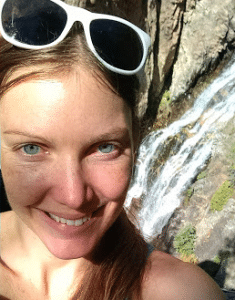By Ms G. (Christine Galib) & Ms. S (Kelly Seibert), co-founders of Be Well. Teach Well.
 Jamie* (name changed) was the high school student who directed his energy to pestering others, defying requests to start working, and retaliating with, “But it wasn’t my fault — he started it, Ms. G!” when I saw him throw paper balls at his friend during my 5th Period class. Don’t negotiate with him, my mentor advised. He wants to argue with you, oppose you, push your buttons, and see what he can get away with. Show him who is in charge. I struggled to digest my mentor’s comments; I wanted to understand why Jamie was reflexively reacting to situations, rather than thoughtfully responding. And, I wondered, how could I use my experiences in mindfulness and yoga to coach Jamie to respond more effectively?
Jamie* (name changed) was the high school student who directed his energy to pestering others, defying requests to start working, and retaliating with, “But it wasn’t my fault — he started it, Ms. G!” when I saw him throw paper balls at his friend during my 5th Period class. Don’t negotiate with him, my mentor advised. He wants to argue with you, oppose you, push your buttons, and see what he can get away with. Show him who is in charge. I struggled to digest my mentor’s comments; I wanted to understand why Jamie was reflexively reacting to situations, rather than thoughtfully responding. And, I wondered, how could I use my experiences in mindfulness and yoga to coach Jamie to respond more effectively?
The 5 Breaths activity was crucial to my behavioral management strategy with Jamie. I told Jamie that whenever he felt anger, frustration, or the impulse to annoy his peers, he had my permission to give me a “secret signal” (index finger indicating the #1) that enabled him to step outside and take 5 Breaths. One condition: the 5 Breaths had to be slow inhales and exhales through the nose, with one hand on his stomach. Jamie’s response to practicing 5 Breaths for the first time was, “Ms. G, was that magic!?” The 5 Breaths activity became our thing. It worked for Jamie because it gave him something to do with his body, his breath, and his mind—something on which he wasn’t graded or judged. By directing his energy to his breath, Jamie created time for a response instead of a reaction. For Jamie, this activity gave him control in a situation over which he felt he had none.
As miraculous as the effects may have seemed to Jamie, the slow, deep breathing wasn’t magic. Slow, deep breathing stimulates the parasympathetic nervous system—the body’s “rest and digest” system that decreases heart rate and blood pressure, signaling to the body that it is an appropriate time to relax.
In too many school settings, students like Jamie hear constant commands from teachers and administrators: “sit down, be quiet, sit still, pay attention, stay awake, control yourself.” While these commands—which are more common than the hot chips you see in the school cafeteria—are in place to create order and discipline, how often are students, especially ones with Oppositional Defiant Disorder (ODD), actually given the tools and training to truly understand how to comply? Sitting still and paying attention is hard! Just ask any adult who has sat through a staff meeting recently.
For students who may be on the Attention Deficit or Oppositional scale, constantly hearing these commands—without having an accessible toolkit of strategies to manage their bodies, emotions, and thoughts—can be a serious stressor. This stress often activates the sympathetic nervous system, responsible for the “fight-or-flight” reaction (increased heart rate, increased blood pressure, and increased signaling to the body to either “fight” or “flee” from an emergency situation—or to flat-out “freeze”). This creates a negative feedback loop, but one that can be broken by giving students tools that help calm them and allow the function of reason to kick in. By letting himself breathe, Jamie was enabling his body to relax, rather than engage his “fight-or-flight” stress reaction.
Teaching students mindfulness, meditation, and yoga provides students with tools to slow down the moment and create time to respond to stressors, which helps students navigate the narrow definition of an ideal learner that we see in our current education system. These tools can be taught in one-on-one interactions similar to Jamie and Ms. G’s story, or in whole-class settings, similar to Ms. S’s story about bringing meditation to her class of 8th graders in Southeast Houston:
At the end of March, just before the Texas State Assessment for ELA and Reading, I nervously began guiding my students through five minutes of meditation every single day. We engaged in breathing, visualization, and positive thinking exercises. Mindfulness, meditation, and yoga had very positively impacted my efficacy as a teacher, so I decided the risk of my students thinking I was totally crazy was worth it!
Meditation turned out to be one of the best gifts I ever gave to my students. I know I taught them a lot about reading and writing, and even about social justice and being informed citizens, but I feel meditation had the greatest potential to help my students through the rest of their academic careers and beyond. It gave them an activity that enabled introspection, emotional regulation, and stress management.
For my students, meditation became a daily routine: my students would remind me anytime they thought I would forget about meditation that day. They adopted the tools for themselves, meditating at home before their exams, or meditating for a few breaths to calm their nerves before walking across the stage for their 8th Grade Graduation Ceremony. I knew the tools were working when one of my students—the one whose name EVERY teacher in the school knew because of his seemingly complete lack of self-control—caught me when I was being very reactive, and offered meditation as an option to self-regulate! I even allowed students to become the guides for meditation and, perhaps unsurprisingly, it was the ODD students who seemed to benefit the most from this experience.
As education leaders reflect on how and what we are actually teaching our students, it is crucial that we consider how mindfulness, meditation, and yoga can provide tools for individual development of self-awareness, self-efficacy, and resilience in nonjudgmental and inclusive ways.
 After working on Wall Street, Christine Galib taught Introduction to BioChemistry I and II Honors, Health and Wellness, Stress Management, and Yoga in Philadelphia, PA. A nationally certified integrative health coach, Christine founded Plan My Plate, a lifestyle management consulting firm, and holds her M.S.Ed. from the University of Pennsylvania, where she continues to work with Teach For America Corps Members pursuing graduate studies in education. She never would have found her place on her yoga mat if a thunder (and lightning!) storm in the mountains of Middlebury, VT hadn’t forced her to forgo her run and take her first yoga class. Realizing yoga was different from every other sport she had played, Christine quickly became an RYT 200 power yoga certified teacher. Yoga brought her to mindfulness, including participating in Penn Medicine’s 8-Week MBSR Program. Since then, Christine has taught mindfulness workshops and professional development sessions. She lives in Houston, TX, where, as a Northeastern transplant to the Lone Star State, she is getting a kick out of walking around in shorts and a t-shirt (and a scarf and a light jacket) in the middle of winter.
After working on Wall Street, Christine Galib taught Introduction to BioChemistry I and II Honors, Health and Wellness, Stress Management, and Yoga in Philadelphia, PA. A nationally certified integrative health coach, Christine founded Plan My Plate, a lifestyle management consulting firm, and holds her M.S.Ed. from the University of Pennsylvania, where she continues to work with Teach For America Corps Members pursuing graduate studies in education. She never would have found her place on her yoga mat if a thunder (and lightning!) storm in the mountains of Middlebury, VT hadn’t forced her to forgo her run and take her first yoga class. Realizing yoga was different from every other sport she had played, Christine quickly became an RYT 200 power yoga certified teacher. Yoga brought her to mindfulness, including participating in Penn Medicine’s 8-Week MBSR Program. Since then, Christine has taught mindfulness workshops and professional development sessions. She lives in Houston, TX, where, as a Northeastern transplant to the Lone Star State, she is getting a kick out of walking around in shorts and a t-shirt (and a scarf and a light jacket) in the middle of winter.
 Kelly Seibert is originally from Albuquerque, New Mexico, where she took her first yoga class at the University of New Mexico in 2006. She immediately fell in love with the sense of calm, balance, and empowerment she got from the practice. After some time working on Capitol Hill in Washington, D.C., Kelly moved to Houston to become an 8th Grade ELA/Reading teacher as a Corps Member with Teach For America, and rediscovered the amazing physical and emotional benefits that yoga has to offer. She has been growing her practice ever since, and became an RYT 200 certified yoga teacher. Kelly taught in Southeast Houston for three years, where she decided to bring yoga and meditation into her Core Subject classroom and saw amazing results. Since leaving the classroom, Kelly has taught yoga, meditation, and mindfulness workshops in the Houston community and in Houston schools. Her goal is to share the benefits of these practices to create a more sustainable and supportive educational environment for students, teachers, and administrators.
Kelly Seibert is originally from Albuquerque, New Mexico, where she took her first yoga class at the University of New Mexico in 2006. She immediately fell in love with the sense of calm, balance, and empowerment she got from the practice. After some time working on Capitol Hill in Washington, D.C., Kelly moved to Houston to become an 8th Grade ELA/Reading teacher as a Corps Member with Teach For America, and rediscovered the amazing physical and emotional benefits that yoga has to offer. She has been growing her practice ever since, and became an RYT 200 certified yoga teacher. Kelly taught in Southeast Houston for three years, where she decided to bring yoga and meditation into her Core Subject classroom and saw amazing results. Since leaving the classroom, Kelly has taught yoga, meditation, and mindfulness workshops in the Houston community and in Houston schools. Her goal is to share the benefits of these practices to create a more sustainable and supportive educational environment for students, teachers, and administrators.

|
Developmentally appropriate conflict resolution solutions!Get this Book Now!A unique approach to helping ourselves and our children deal with conflict Get Susan Fitzell’s book now. Don’t waste any time Free the Children, Conflict Education for Strong, Peaceful Minds Bring Susan to your campus!Featured seminar – Bullying: Choices and Consequences |
 |
For more Behavior Management Strategies,
|

